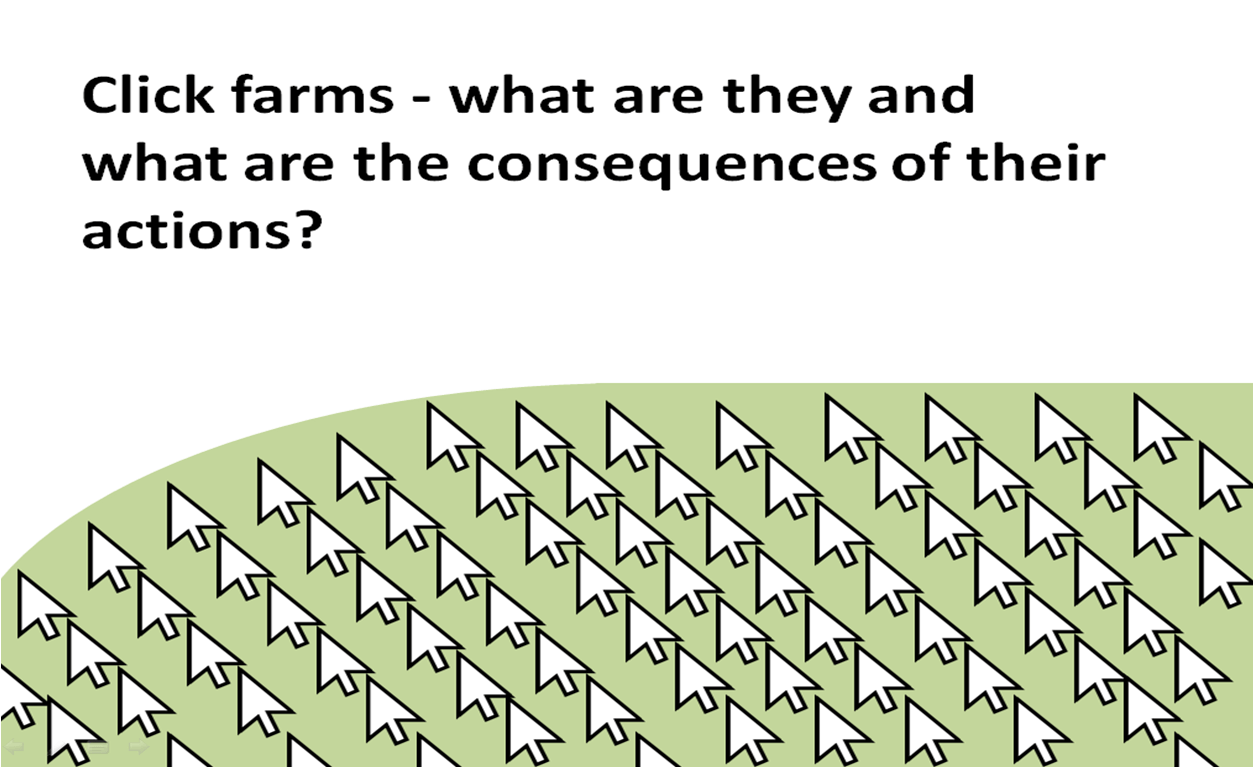Click farms - what are they and what are the consequences of their actions?

source: own elaboration
At a time when social media has become the fifth power gaining followers, likes and comments becomes very important. However, it can be a time-consuming and expensive process. Because of this, click farms have been created, that allow companies (and individuals) to buy likes, ratings and comments in wholesale quantity and very affordable price (a few dollars for 1000 clicks). But the area of activity of such organizations that are messing up statistics is much larger - they can lead to increase costs and generate significant revenue for the fraudster. In this article, we'll try to explain what click farms are and what the effects of their operations may be.
What are click farms and where are they located?
Click farms are a type of online fraud that generates artificial clicks, although in more sophisticated farms the people employed in them can even browse a specific site for a limited time, register in newsletters, etc. Most are usually founded in poorer countries like China, India, Nepal, Indonesia, Sri Lanka, Egypt, the Philippines, Bangladesh, Mexico, Iraq and some Eastern European countries.
Although social media like Facebook, Twitter, YouTube and Instagram are the main area of activity of click farms, they can operate in many areas, including affiliate marketing and Google Ads.
Who is clicking at the click farms?
Most often, a farm consists of a few or a dozen low-paid employees, who click advertisements, posts, fan pages, tweets or other forms of online activity. The people employed there earn around one dollar for 1000 clicks. For example, a click farm discovered and liquidated in Thailand two years ago was paying it’s employees 4$ a day. So the costs are low, and the farm owner can sell clicks at a much higher price - 1000 likes on Facebook costs on the "clicks farm market" about 30 $, 250 Google+ shares - 13 $, and 1,000 Instagram hearts – 12 $.
How does click farms look like?
Although clik farms can deceive complicated algorithms that detect fraud, they actually work in a very simple way and do not have to be technologically advanced at all. They are often small offices equipped with thousands of mobile devices operated by several people to "produce" very large amounts of clicks.
Why are click farms so dangerous?
Although click farms workers are very low paid, most of them prefer to earn a living by clicking, than by doing a different job. Thanks to this, they are loyal to the employer, which makes them difficult to locate. The clicks created by click farms, though "cheated", come from people, which means they are different from those generated by BOTs. All this makes them hard to detect. This is one of the most important reasons why click farms are so dangerous - because for many algorithms fraud clicks generated by click farms are basically invisible.
What kind of services do click farms offer?
Click farms offer a whole range of services. Most often, they propose to their clients to obtain for them likes, comments, ratings, reviews, sharings of their websites or others forms of activity in social media. Another service may be clicking advertisements of competing companies, which generates high costs for them. Using this option, a click farm customer can also get a better position in Google search results - instead of winning with a competitor by offering a higher price for each Google Ads click, he chooses a much cheaper option - exhaustion of the advertising budget of the business opponent. Another form of this scam can be employing people to click on ads on your own site. In this case, the advertiser, unaware of fraud, pays the owner of click farms for the marketing services.
Are click farms legal?
Although the artificial generation of clicks is contrary to the regulations of most social networking sites and technically is a fraud, the law of most countries does not explicitly say anything about them. Although most click farms operate in secret, some of them bluntly offer their services by describing them as "getting clicks".
According to The Guardian, 31% of people check the ratings, review, number of likes and followers in social networks before making a decision to buy or in other important issues (even such as the election of the president). That's why these statistics are so important, and click farms very popular. Millions of clicks generated by them are high costs and worthless traffic for their client's competitors, and because the scale of the phenomenon is huge - almost everyone can fall victim of them. It is estimated, for example, that from 15 to even 17 percent of all Twitter accounts are fake accounts established for the needs of click farms. In order to effectively protect yourself against them, you should use the services of professionals.

